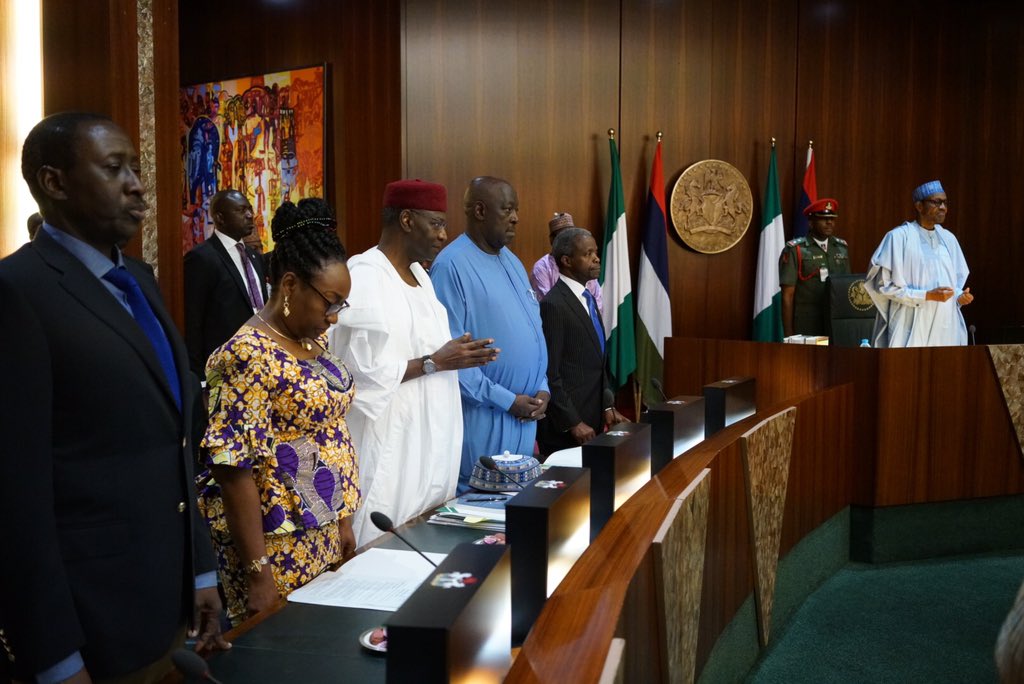FG sets up National Minimum Wage Committee

The Federal Executive Council, FEC, has approved the constitution of a National Minimum Wage Committee to kick start the process of deliberations for a new wage for Nigerian workers.
Briefing journalists at the end of the meeting presided over by Acting President, Yemi Osinbajo, at the Presidential Villa, Abuja, yesterday, the Minister of Labour and Employment, Chris Ngige, said the committee would be made up of 29 members.
Ngige said members of the committee would be drawn from organised Labour, federal and state governments. He said the chairman and secretary of the committee would be appointed by the government.
The minister said: “Council deliberated on the report of the joint committee of government on one side and the labour federation of NLC and TUC.
“If you recall, on May 11, 2016, there was a deregulation of oil and gas sector in Nigeria and this resulted in increase we had in the PMS, otherwise called petrol, and as a result of that, the labour federation kicked against the increase and said if even the increase will be there, government should put in place, mechanism to make sure that we do not have further increases.
“In that wise, they said PPPRA board should be put in place. Two, they also asked for a review of the minimum wage available to workers in the country in order to enable them have better purchasing power.
“Prior to the increase, they have made a demand of N56,000 monthly as the lowest paid wage to any Nigerian worker, which we call minimum wage. Third, they said they would need some palliatives to cushion the effect of increase in pump price of petrol, transportation allowances and things like that.
“So, government put in place that committee. That committee finished its work on April 21 and handed the report to the SGF.
“Today at Council, I presented the report with the various recommendations therein and I am happy to let you know that government has approved the setting up of a national minimum wage committee, comprising 29 persons, with a chairman and a secretary.
“Composition of this committee is that, the federal government will contribute five persons from the public sector, the state governors who are major stakeholders will contribute six governors, one from each geopolitical zone.
“Then the labour federations will present eight persons and the organized employers association represented by Manufacturers Association of Nigeria, Chamber of Commerce and Small and Medium Enterprises will jointly produce eight persons. Government will appoint the chairman and the secretary.”
Also speaking, the Minister of Budget and National Planning, Senator Udo Udoma, said FEC had begun the review of the 2017 budget passed by the National Assembly recently.
“One of the things we discussed in council was the GDP report for the first quarter which was released yesterday by the NBS.
“We found the first quarter encouraging, even though during the first quarter, we are still in a recession. But we found it very encouraging as the best result for the past three or four quarters. And it is a sign that we are moving out of recession,” he said.
The Minister also stated that Nigeria was on its way out of recession, saying that indicators in the first quarter of 2017 looked better.
Similarly, the Minister of Interior, Danbazzau, told journalists that FEC deliberated on ways of decongesting prisons.
According to him, the Acting President has directed him to submit a memo seeking the relocation of prisons from urban to rural areas.
He said that some state governments, including Lagos, Akwa Ibom and Kano, have already agreed to donate land for the relocation.
He said: “In today’s council, I looked at the situation in Nigerian prisons, including the conditions of inmates and state of the prisons themselves. This came out as a result of council’s directive a few weeks back.
“We looked at the criminal justice administration and some of the things we briefed the council are that most of the prisons are old. As a matter of fact, quite a number of them were built about 100 years ago.
“They are dilapidated and lack the platform for rehabilitation. The major problem is the issue of awaiting trial of inmates. Today, about 70 percent of awaiting trial constitute the prisons inmates, 30 percent of them are convicted.
“So, this is the situation. It gives a lot of stress to the prisons system in terms of rehabilitation, feeding and providing other essential amenities. It also makes the general administration extremely difficult.
“So, we made some suggestions as to how these problems can be tackled. About 200 of those inmates awaiting trial have been in prison for over 11 years. Quite a number of them have been in prison for about 5 to 10 years.
“So, we are looking at ways that through prerogative of mercy, state pardon or those who are condemned after staying for more than 10 years, whether such conviction to death can be committed to life imprisonment and those who have been there on life jail that have served 10 years and above can have some relief. So, these are some of the issues we looked at.”
On his part, the Minister of State for Environment, Usman Jubril, said Council had given approval for the take off of National Forest Trust Fund. According to him, the development would help in the management of forest.
“Today, council looked at the issue of aforrestation and sustainable forest management in the country and subsequently approved the take off of National Forest Trust Fund. You are probably aware that in the last 5 months, we suspended the issue of sighting permit that would allow export semi-proceed woods out of the country”, he said.









0 Comments